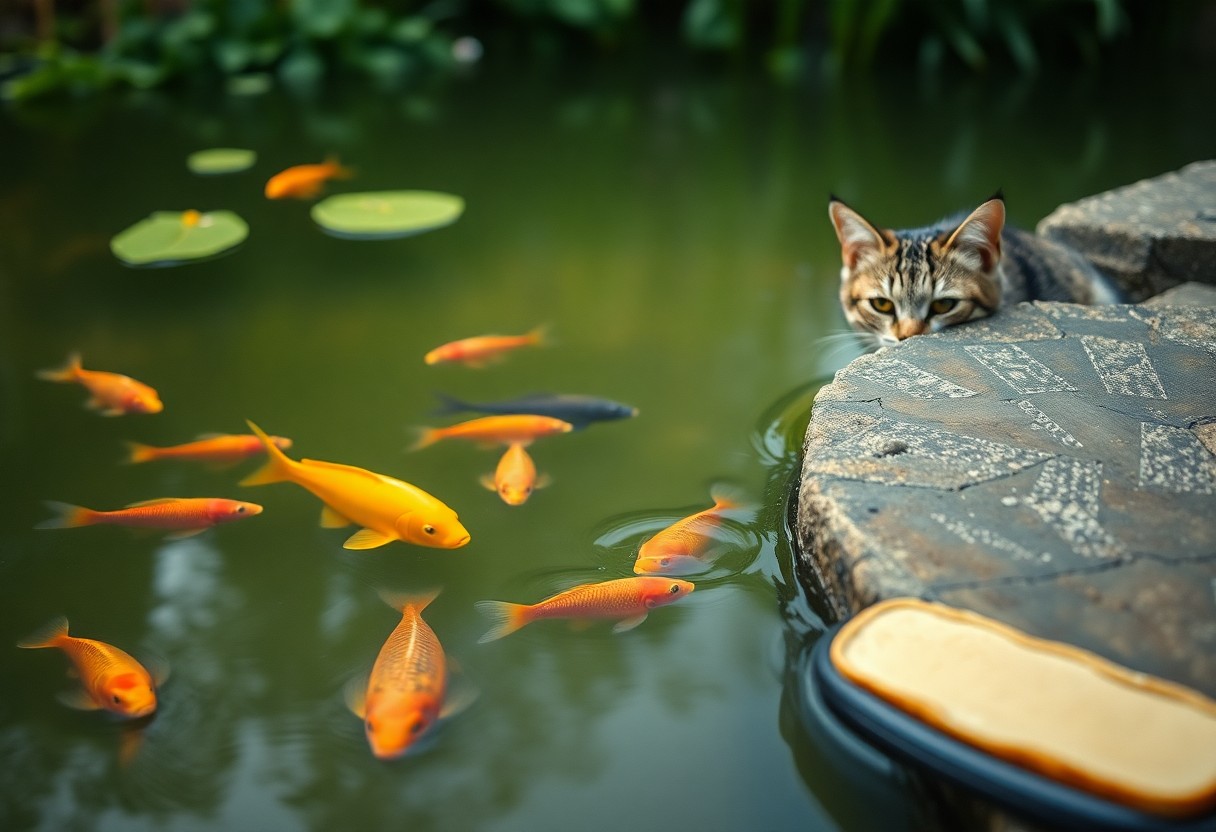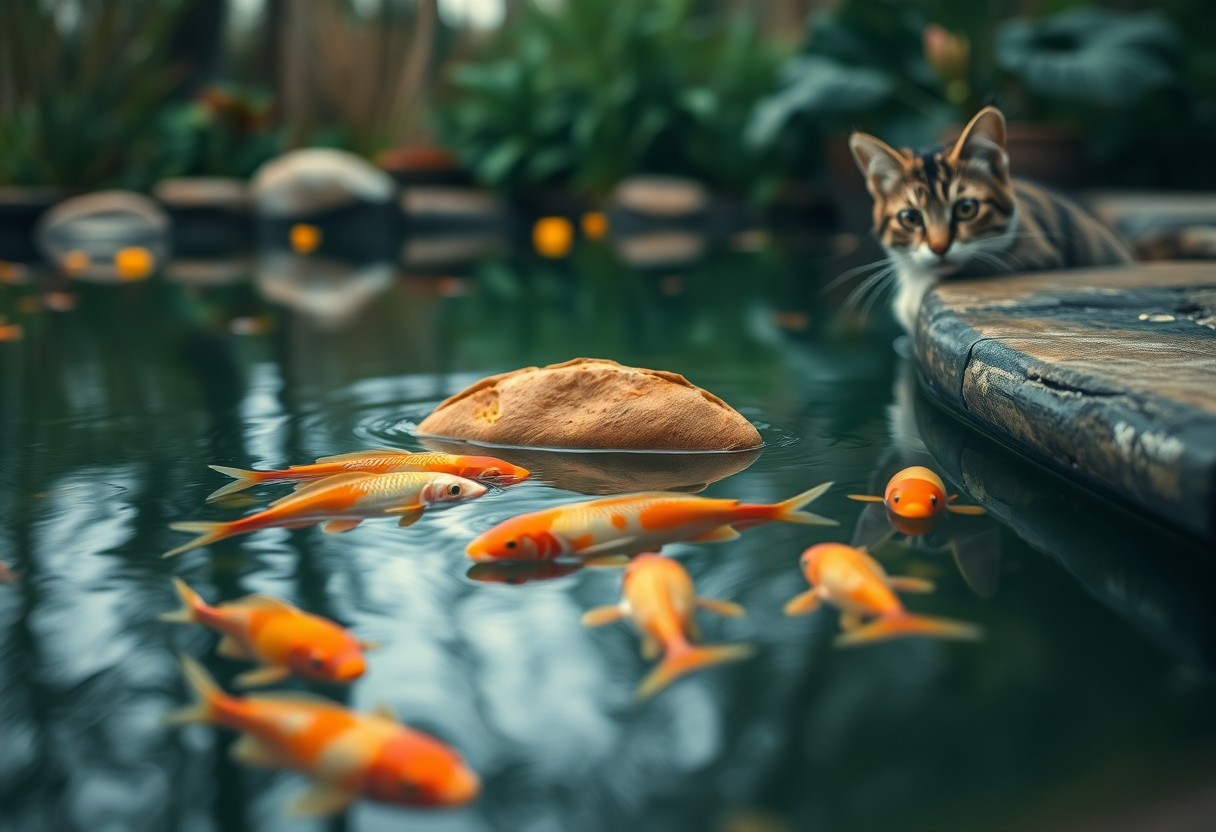There’s a lot of curiosity surrounding what you can feed your pond fish, including dog or cat food and even bread. While these might seem like convenient options, they can lead to serious health issues for your fish. It’s important to know that the wrong food can result in water quality problems and digestive complications. In this post, we’ll explore the suitability of these foods for pond fish and provide the best feeding practices to keep your aquatic friends healthy and thriving.
Table of Contents
Key Takeaways:
- Pond fish have specific dietary needs that may not be met by dog or cat food, which is formulated for different species.
- Feeding pond fish bread can lead to digestive issues and bloating, as they are not designed to process this type of food.
- Processed pet foods may contain ingredients that can harm pond fish, making them unsuitable for their diets.
- Opt for fish-specific foods that provide the necessary nutrition for optimal health and growth.
- Offering a varied diet of aquatic plants, insects, and commercial fish pellets is beneficial for pond fish.
Understanding Pond Fish Dietary Needs
To provide your pond fish with an optimal environment, you must understand their dietary needs. A balanced diet ensures your fish remain healthy, vibrant, and active. Adaptability is key, as different species may have unique nutritional requirements. Tailoring their diet not only promotes growth but also enhances their immune system, allowing them to thrive in the ecosystem you’ve created.
Natural Diet of Common Pond Fish
Between insects, plants, and small crustaceans, common pond fish naturally thrive on a varied diet. Species such as goldfish and koi often consume algae and detritus, while others may feast on insect larvae or even small fish. Understanding the natural feeding habits of your pond fish helps you choose the right supplementary food to meet their needs.
Nutritional Requirements
Across different species, pond fish have distinct nutritional requirements that include proteins, fats, carbohydrates, vitamins, and minerals. Each element plays a role in their overall health, growth rate, and reproductive success. Ensuring that your fish receive a well-rounded diet is necessary for their well-being.
At every stage of growth, fish require a balanced intake of proteins for muscle development, carbohydrates for energy, and fats to support their overall health. Essential vitamins, such as A, D, and E, bolster their immune systems, while minerals like calcium and phosphorus are vital for skeletal health. Feeding your fish a high-quality diet specifically formulated for their species type is a significant step in preventing nutritional deficiencies which can lead to health issues. Investing time in understanding and providing appropriate nutrition ensures your pond fish enjoy a long, healthy life.
Commercial Pet Food as Fish Feed
While many fish enthusiasts explore various feeding options, commercial pet food can sometimes play a role in your pond fish’s diet. Fish can consume certain types of commercial pet food designed for dogs and cats, although it is necessary to keep in mind that not all ingredients are suitable for aquatic life. Always check the ingredients to ensure you’re providing a balanced diet that meets your pond fish’s nutritional needs.
Dog Food Considerations
Commercial dog food may seem like a convenient option for feeding your pond fish, but its high protein content and fatty acids can occasionally lead to health issues for fish. Choose formulations that are free from artificial additives and contain primarily fish-based proteins. However, it is necessary to limit the frequency and amount you feed to avoid water quality issues.
Cat Food Considerations
Food designed for cats is another alternative; however, you should be mindful of its high fat content. While your pond fish can digest cat food components, regular consumption may lead to obesity and health complications. Always look for high-quality cat food with fish as the primary ingredient and free from any artificial fillers or preservatives to promote a healthier fish diet.
Food designed for cats can vary significantly, and this can affect its suitability for your pond fish. Look for options that contain natural ingredients and avoid those that include additives like onion or garlic, which are toxic to fish. A small amount of cat food as an occasional treat is permissible, but it should not replace a diet composed primarily of aquatic-based pellets or appropriate fish food to ensure your fish remain healthy and thrive.
Bread as Fish Food
Once again, you may be tempted to toss some bread into your pond for your fish. While this seems like an easy option, it’s imperative to understand that bread is not a natural part of a fish’s diet. Some aquarists even question the idea of Feeding fish dog food???, underscoring the need for appropriate nutrition.
Nutritional Value
Against popular belief, bread lacks the necessary nutrients that fish require for their health. It is primarily made of carbohydrates, which can lead to an imbalanced diet if overfed.
Potential Risks
To provide a clearer picture of the risks, bread can cause digestive issues in your fish, leading to bloating or poor health. Additionally, uneaten bread can pollute the water, creating an inhospitable environment for your aquatic pets.
Consequently, consider that feeding bread to your fish can lead to severe health problems including bacterial infections or even death if overconsumed. The leftover bread in the water can decompose, resulting in poor water quality and affecting the overall ecosystem in your pond. It’s best to choose specialized fish food that meets their dietary needs.
Impact on Water Quality
Many factors influence the water quality in your pond, and the food you provide can significantly affect it. Offering unsuitable foods like dog or cat food, or even bread, can lead to water contamination and health issues for your pond fish. As these foods break down, they decompose, introducing excess nutrients that encourage harmful algal blooms and disrupt the natural balance of your pond ecosystem.
Food Decomposition
Water quality can deteriorate when organic matter, such as uneaten food, decomposes. This process consumes oxygen from the water, which is necessary for aquatic life. If your pond fish cannot obtain enough oxygen, it may lead to stress and increased mortality rates among fish populations.
Water Parameter Changes
Below the surface, the introduction of inappropriate food sources can alter key water parameters. Increased decomposition means higher ammonia levels, which can be toxic to your fish. Additionally, the breakdown of these foods can lead to fluctuations in pH and dissolved oxygen levels, ultimately creating an unhealthy environment for your aquatic inhabitants.
Food decomposition not only adds excess nutrients but also directly affects your pond’s oxygen levels. As organic materials break down, the demand for oxygen increases, leading to hypoxia, which is harmful to fish. Frequent feeding of unsuitable items can cause these significant shifts, potentially resulting in unusual fish behavior or a greater risk of disease. Keeping a watchful eye on the types of food you provide will help maintain a healthy aquatic ecosystem.

Proper Feeding Guidelines
Despite the temptation to feed your pond fish non-standard items like dog food, cat food, or bread, it’s vital to follow proper feeding guidelines to ensure their health. For further insights on Feeding Bread – Pond Boss Forum, explore discussions by seasoned pond owners. Adhering to recommended practices helps maintain a balanced ecosystem in your pond and prevents potential health issues.
Recommended Food Types
Against feeding unverified food sources, stick to these recommended types:
- Pond Pellets
- Fish Flakes
- Vegetables
- Table Scraps
- Specialized Fish Food
The right food contributes to the overall health of your fish.
Feeding Frequency and Amount
Frequency of feeding should align with the needs of your pond fish. Regularly provide food, ideally once or twice a day, ensuring that you offer only what they can consume in a few minutes to avoid waste.
The amount of food you distribute is important for maintaining water quality and fish well-being. Feeding too much can lead to overcrowding and water pollution, while feeding too little may leave your fish hungry and stressed. You should monitor how your fish react to feeding, adjusting the amount accordingly based on their appetite and activity levels. Over time, you’ll develop a more personalized feeding routine that benefits both you and your aquatic pets.
Alternative Food Options
After exploring traditional feeding options, it’s imperative to consider alternative food options for your pond fish. These alternatives can provide a more balanced diet, ensuring your fish remain healthy and vibrant. Exploring both commercial and natural food sources will give you a better understanding of optimal feeding practices.
Commercial Fish Food
Commercial fish food is specially formulated to meet the dietary needs of pond fish, providing a balanced blend of proteins, vitamins, and minerals. When choosing commercial feeds, opt for high-quality brands that specify the nutritional content. You should look for food appropriate for your specific type of fish to promote growth and health.
Natural Food Sources
Natural food sources can be an excellent addition to your fish’s diet. These sources include insects, crustaceans, and plant matter, which can often be found in and around your pond ecosystem. You can also encourage beneficial organisms to thrive in your pond.
For instance, you might notice small aquatic insects like mosquito larvae or daphnia that your fish will enjoy. Additionally, algae and various water plants provide imperative nutrients and a natural source of food. These natural sources often lead to healthier fish, as they promote a varied diet, mimicking what they would naturally consume in the wild. Ensure you maintain a balance in your pond’s ecosystem to support these natural food sources effectively.
Conclusion
On the whole, while it may be tempting to feed your pond fish with dog food, cat food, or bread, it’s crucial to consider their dietary needs. These foods are not designed for aquatic life and can disrupt the balance in your pond. Instead, you should opt for specialized fish food that meets the nutritional requirements of your pond fish, ensuring their health and wellbeing. Providing them with the right food not only promotes their growth but also keeps your pond ecosystem thriving.
FAQ
Q: Can pond fish eat dog food?
A: While pond fish can consume dog food in small amounts, it is not recommended as a regular part of their diet. Dog food lacks important nutrients that fish require for optimal health. It is better to stick to fish food specifically formulated for their dietary needs, which ensures they receive appropriate vitamins and minerals.
Q: Is cat food safe for pond fish?
A: Feeding pond fish cat food is not advisable. Cat food generally has a higher protein content and may contain ingredients that are not suitable for fish digestion. Over time, this could lead to health issues for the fish. For a balanced diet, it’s best to use fish food that is tailored for pond inhabitants.
Q: Can pond fish eat bread?
A: Though some pond fish may nibble on bread, it should be avoided as a food source. Bread can expand in the fish’s stomach, potentially causing digestive problems. Additionally, it does not provide the necessary nutrition that fish require. Stick to specially designed fish food to keep your pond fish healthy and thriving.
Q: What happens if pond fish eat dog or cat food regularly?
A: Regularly feeding pond fish dog or cat food can lead to nutritional deficiencies and health problems. These foods are not designed for aquatic creatures. Long-term consumption can adversely affect growth, cause lethargy, and weaken their immune system. Proper fish food should always be the priority for maintaining their health.
Q: What is the best diet for pond fish?
A: The best diet for pond fish includes high-quality fish pellets or flakes that provide balanced nutrition for their specific species. Additionally, you can incorporate occasional treats like peas, lettuce, or specialized treats that cater to your fish’s dietary needs. Regularly vary their diet to promote overall health and vitality.

